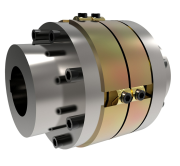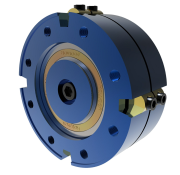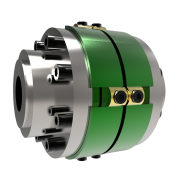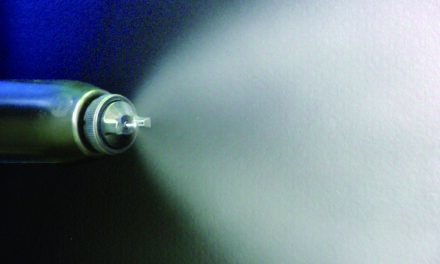 Howdon Power Transmission has been involved in the design and manufacture of torque limiters for 40 years. The company invented the revolutionary Wedgegard Shearpin Torque Limiter in 1977 to address demand for a simple solution to torque overload.
Howdon Power Transmission has been involved in the design and manufacture of torque limiters for 40 years. The company invented the revolutionary Wedgegard Shearpin Torque Limiter in 1977 to address demand for a simple solution to torque overload.
Traditional overload clutches and torque sensors can be expensive and complicated to use. Howdon developed its wedge-shaped shearpin to overcome the problems associated with conventional round shearpins. Since then, a wide range of overload clutches have been developed to incorporate the Wedgegard Shearpin Torque Limiter. These are used around the world to protect conveyor drives, sewage and process pumps, road tanker PTO drives, steel and paper mills, marine propulsion systems and many other applications.
 Howdon continues to build on the success of the Wedgegard Shearpin Torque Limiter, developing robust, dependable torque limiters to avoid the mechanical drive overload problems that can occur under the increasing demands of today’s processing plant.
Howdon continues to build on the success of the Wedgegard Shearpin Torque Limiter, developing robust, dependable torque limiters to avoid the mechanical drive overload problems that can occur under the increasing demands of today’s processing plant.
Why use a Wedgepin?
- Wedge construction gives maximum rigidity with no backlash – ideal for indexing or reversing drives.
- Easy access – drive re-set in minutes with no special tools required (just one Allen key)
- Clamping screws give positive axial location so the shear neck cannot be displaced from the correct position between flanges.
- Equal load sharing with multiple pins on high torque drive gives a very high capacity within compact dimensions.
- Shear necks are standardised and coded, giving safe, tamper proof repeatability and spares economy.
- ‘Fail safe’ under all conditions, the Wedgegard is not effected by changes in temperature or humidity. The ability to release is not dependent on mechanism lubrication
The heart of the Wedgegard products is the Wedgepin
 Howdon has invested significantly in custom-built static and dynamic test rigs to ensure that the Wedgepins break at their rated torque and within tolerance. This gives customers confidence in Howdon Wedgegard products.
Howdon has invested significantly in custom-built static and dynamic test rigs to ensure that the Wedgepins break at their rated torque and within tolerance. This gives customers confidence in Howdon Wedgegard products.
Different batches of the same grade material vary in tensile strength within the grade’s band. For example the grade of brass we use in our Wedgepins is CW712R (CZ112) Naval Brass. This for example has a tensile strength of between 340 and 400 mPa. Traditional round shear pins are mass produced with a fixed neck diameter. This means that if not tested each batch of shear pins could have large variations in breaking/shear torque. Our test department can test both statically and dynamically to take into account the differing material tensile strength, determining the correct Wedgepin neck diameters required. Therefore ensuring continuity of breaking torque between batches. Howdon state a tolerance of between ±10% and ±15% but in reality when checking, most pins are within 5%. We have full traceability of the materials used in each batch of Wedgepins to ensure this happens.
The dynamic test rig has a disc brake and pneumatically actuated thruster which is pulsed to simulate loading on the Wedgepins. Both braking force and pulse frequency can be adjusted to simulate peak and intermittent loading, determining the fatigue life of the pins. This is something unique to Howdon and demonstrates our commitment to continuous improvement and new developments.
 Howdon is committed to testing the materials we use, combined with using state of the art 3D CAD software and CNC manufacturing, ensures that our Wedgepins are made to the highest standards.
Howdon is committed to testing the materials we use, combined with using state of the art 3D CAD software and CNC manufacturing, ensures that our Wedgepins are made to the highest standards.
Howdon Power Transmission
Email: sales@howdon.co.uk
Tel: +44 (0)1453 750814
Web Site: www.howdon.co.uk

